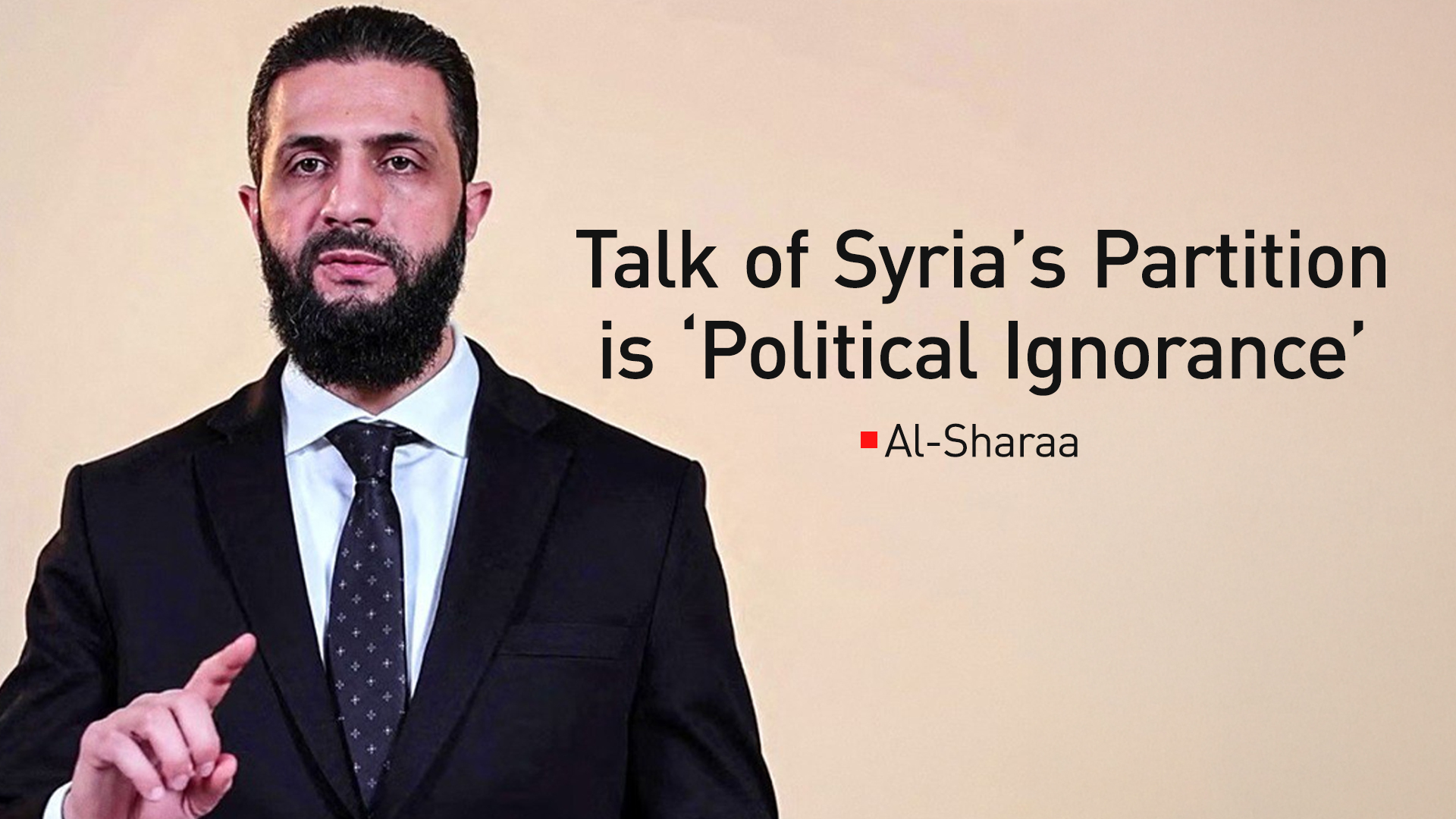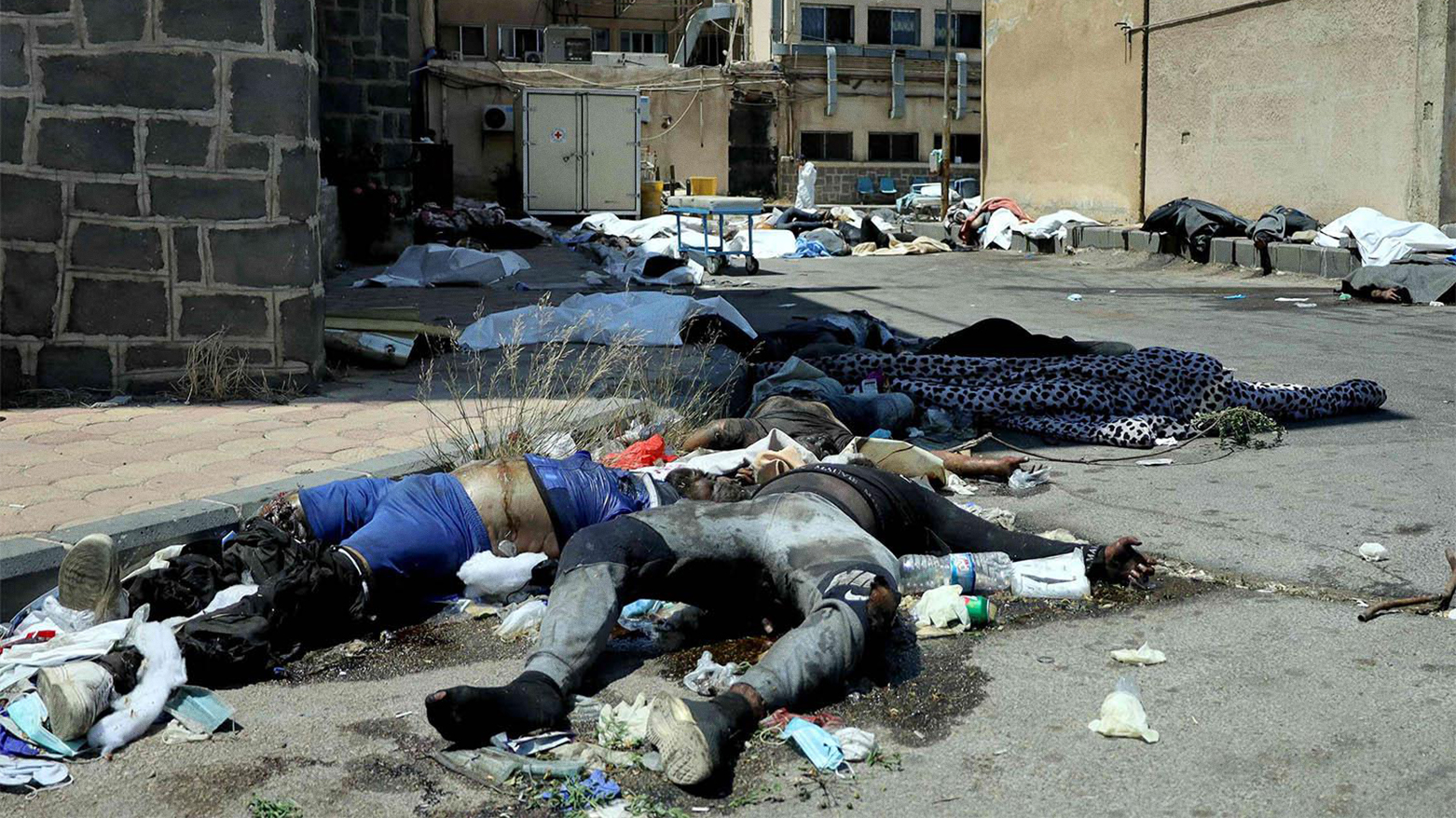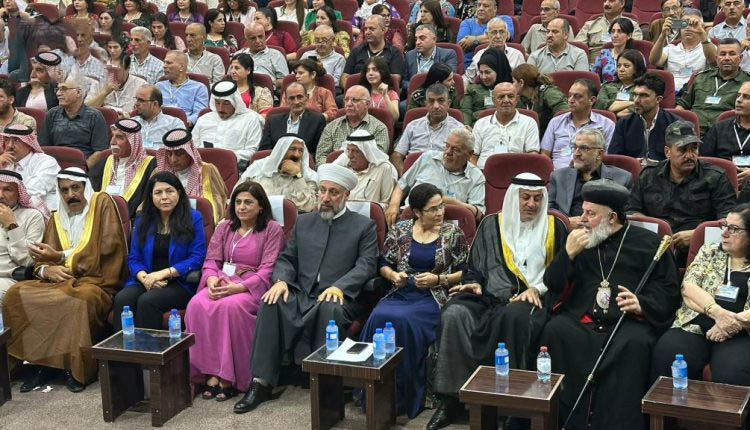Al-Sharaa Rejects Partition as Sweida Crisis, Calls for Federalism Challenge Damascus's Vision for a Unified Syria
Syrian President Al-Sharaa rejects partition as "impossible," while Sweida protests demand independence amid a deadly crisis and a diverse coalition in northeast Syria, including Druze and Alawite leaders, calls for a decentralized state, drawing a fierce rebuke from Damascus.

ERBIL (Kurdistan24) – Syrian President Ahmed Al-Sharaa has unequivocally rejected any possibility of the country's partition, labeling such scenarios as "impossible" and the product of "political ignorance," according to a report by Sky News Arabia. His forceful defense of a centralized, unified Syria comes at a moment of profound national crisis, set against a backdrop of deadly unrest in Sweida, where demands for independence are escalating, and a landmark conference in the northeast where a diverse coalition of communities, including prominent Druze and Alawite leaders, has formally endorsed a vision for a decentralized, federal state.
In a detailed account of a dialogue session held Saturday evening in Idlib province, Sky News Arabia reported that Al-Sharaa addressed an audience of ministers, academics, politicians, and local notables, delivering a stark warning against any attempts to divide the nation. "He who calls for partition in Syria has political ignorance, and is a dreamer," Al-Sharaa stated, adding that "many times dreamy ideas lead their proponents to suicide."
Dismissing the potential for fragmentation, the Syrian President asserted his confidence in the country's resilience. "I do not see that Syria has risks of division; there are desires among some people for the division of Syria, attempts to create local and internal cantons, but logically, politically, ethnically, and realistically, this is impossible to happen," he was quoted as saying by Sky News Arabia.
The report detailed his caution against "negative competition, voracity for positions, political sharing, and the search for roles," which he argued could undermine the societal structure during the critical "state-building phase."
Al-Sharaa also appeared to address nascent movements in the country's south, suggesting that external support would prove futile. "Some parties seeking strength from regional powers, like Israel, is a very difficult thing," he remarked, according to the Sky News Arabia report. "The southern region is densely populated and any enemy that wants to enter it will be forced to place a policeman at the door of every house, and this thing is difficult in reality."
Specifically referencing the recent turmoil in Sweida, the Syrian President pledged that his government was committed to justice.
The Sky News Arabia dispatch noted that Al-Sharaa "stressed that the state is committed to holding the perpetrators of the violations in Sweida accountable." However, this promise of accountability from Damascus is juxtaposed with a grim and escalating reality on the ground in the southern governorate, as documented by human rights monitors and reported by Kurdistan24.
The Unfolding Crisis in Sweida
The events in Sweida, which President Al-Sharaa addressed, represent a starkly different reality from the vision of unity projected from Damascus.
According to a Kurdistan24 report citing the Syrian Observatory for Human Rights (SOHR), hundreds of demonstrators took to the streets in Sweida on Saturday, August 16, under the slogan "The Right to Self-Determination." The protests constituted a categorical rejection of the transitional government, with participants demanding independence and the trial of officials they deem responsible for crimes against civilians.
The SOHR report highlighted the depth of the grievances, noting that some protesters raised Israeli flags alongside the flags of the Druze community in a direct call for international intervention, a move that reportedly caused contention within the demonstration. Banners displayed photos of victims, demanding justice and stressing that their calls for self-determination must be respected "free from any external guardianship or disregard for their demands."
Beyond the political demands, the protests carried urgent humanitarian appeals. Kurdistan24, citing the human rights monitor, reported on the desperate calls for the opening of humanitarian corridors and the establishment of an airlift to transport critical medical and food supplies into a region facing what was described as an almost complete cutoff of basic necessities.
The catalyst for this wave of protests, which SOHR noted began on July 28, was a deadly escalation involving Bedouins and forces from the Syrian Ministries of Defense and Interior. The violence that ensued has resulted in a staggering death toll, painting a grim picture of the violations Al-Sharaa has promised to investigate.
In a separate and harrowing report also covered by Kurdistan24, SOHR documented that the death toll in Sweida since July 13 had risen to 1,677. This figure includes casualties from clashes, Israeli airstrikes, and, most chillingly, field executions.
The human rights group confirmed that 452 Druze victims—including 43 women, 14 children, and 20 medical staff from Sweida National Hospital—were executed by Defense and Interior Ministry forces. The total number of fatalities from Sweida province stands at 725, most of them Druze civilians.
The Observatory reaffirmed its commitment to documenting these violations to support efforts to protect civilians and expose the crimes committed against them.

A Competing Vision Emerges from the North and East
While Damascus grapples with the violent crisis in the south, a powerful political challenge to its centralist ideology has formally emerged from the north and east.
A two-day conference in Hasakah, held under the banner “Together for Diversity that Strengthens Our Unity… Through Partnership We Build Our Future,” brought together representatives from the region’s Kurdish, Arab, Syriac Assyrian, Turkmen, Armenian, and other communities to outline a unified vision for a decentralized Syria.
As reported by Kurdistan24, the conference culminated in a landmark endorsement of a federal-style system from prominent religious leaders of the country's Druze and Alawite communities, delivered via video messages.
His Eminence Sheikh Hikmat al-Hijri, a leading Druze authority, framed the gathering as "a call to the national conscience," pledging to stand in solidarity with all the region’s components and affirming that "diversity is not a threat, but a treasure that strengthens our unity."
Even more explicitly, Sheikh Ghazal Ghazal, the head of the Supreme Alawite Islamic Council, advocated for the creation of "a civil, secular, pluralistic, and decentralized state." In his message, reported by Kurdistan24, he stated that "a decentralized or federal system is the real guarantee for securing the rights of the communities in a new Syrian constitution."
He directly referenced the recent violence, pointing to "scenes of crimes committed against communities in Syria under modern rule in Sweida" as an urgent impetus for fundamental change.
The conference's closing statement, read by Sheikh Hassan Farhan Abdulrahman of the Tayy tribe, solidified this vision. It condemned the atrocities in Sweida and elsewhere as crimes against humanity and presented the Democratic Autonomous Administration of North and East Syria (DAANES) as a viable "participatory governance model."
Furthermore, the participants lauded the sacrifices of the Syrian Democratic Forces (SDF), describing it as "a necessary nucleus for building a new, professional, voluntary Syrian national army." The collective resolve was to forge a "free, unified, democratic, pluralistic, and decentralized Syria."

Damascus's Forceful and Uncompromising Rebuke
The Syrian government's reaction to the Hasakah conference was swift and severe, dismissing the gathering as an attempt to undermine national unity.
In a detailed statement carried by the Syrian Arab News Agency (SANA) and reported by Kurdistan24, a government official condemned the event, accusing DAANES and its partners of attempting to "fragment the country."
The Damascus statement characterized the conference as a "fragile alliance of actors disgruntled by ‘the Syrian people’s victory and the fall of the former regime era’" and rejected its outcomes entirely. "The form of the state is not to be decided through factional agreements," the official statement read, "but through a permanent constitution approved by public referendum."
Damascus accused the organizers of convening to "evade future obligations" and to "reject the principles of a unified state—one army, one government, and one country." In one of its most serious allegations, the government claimed the conference served as a cover for "systematic demographic change policies" targeting Syrian Arabs, which it alleged were "carried out by extremist Kurdish factions taking orders from Qandil."
The diplomatic fallout was immediate. Damascus announced the event had "dealt a blow to ongoing negotiations" and declared it would not attend upcoming meetings in Paris, refusing to negotiate with any party it accused of seeking to revive the former regime.
The government concluded by demanding that all future negotiations be relocated to Damascus, which it deems the "sole legitimate and national venue for Syrian dialogue."
This profound clash of ideologies—between a government in Damascus insisting on absolute territorial and political unity, and a growing, diverse coalition in the north and east championing a decentralized model, all while a violent crisis unfolds in Sweida—illustrates the widening chasm over the very identity and structure of a future Syria.
President Al-Sharaa's declaration that partition is "impossible" stands in direct opposition to powerful political and social currents that are increasingly challenging the foundations of the centralized state.
